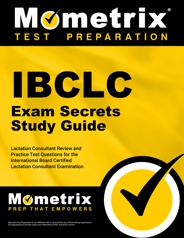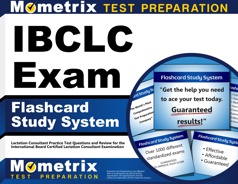The International Board of Certified Lactation Consultant Examiners (IBLCE) administers the International Board Certified Lactation Consultant (IBCLC) certification exam to assess the knowledge and skills of prospective IBCLC health care workers.
Click “Start Test” above to take a free IBCLC practice test!
IBCLC Eligibility
To sit for the IBCLC exam, you must meet several criteria via one of three pathways. All pathways ensure applicants possess the necessary health sciences background, including a minimum of 95 hours of education related specifically to lactation, and ample relevant clinical experience. All candidates must also attest to their adherence to the IBCLC Code of Professional Conduct.
The eligibility pathways are as follows:
Pathway 1
In order to use this pathway, you must demonstrate education in a clinical healthcare profession recognized by IBLCE, government recognition of your profession, or education completed in an approved health science subject. Additionally, you must demonstrate 95 hours of lactation-specific education (completed within five years of application), and 1,000 hours of supervised lactation-specific clinical experience (within five years of application).
Pathway 2
In order to use this pathway, you must demonstrate education in a clinical healthcare profession recognized by IBLCE, government recognition of your profession, or education completed in an approved health science subject. Additionally, you must demonstrate that within the five years prior to application, you completed a Commission on Accreditation of Allied Health Education Programs (CAAHEP) accredited academic program in lactation and breastfeeding, including 95 hours of lactation-specific education and 300 hours of supervised lactation-specific clinical experience.
Pathway 3
In order to use this pathway, you must demonstrate education in a clinical healthcare profession recognized by IBLCE, government recognition of your profession, or education completed in an approved health science subject. You must also demonstrate 95 hours of lactation-specific education completed within five years of application, including 500 hours of supervised lactation-specific clinical experience completed within the five years prior to application.
IBCLC Exam Outline
The IBCLC exam contains 175 multiple-choice questions and has a time limit of 4 hours.
The exam is split into seven sections:
I. Development and Nutrition (32 questions)
The questions in this section are split into two categories: Infant and Maternal.
Infant
- WHO guidelines for introducing complementary foods
- WHO growth charts with gestational age adjustment
- Feeding behaviors at various ages
- Low birth weight
- Skin tone
- Muscle tone
- Milk banking
- Food allergies
- Term development and growth
- Stooling and voiding
- Infant anatomy
- Nutritional requirements
- Preterm development
- Preterm behaviors
Maternal
- Maternal nutritional status
- Maternal anatomical challenges
- Breast development and growth
- Nipple modifications
- Breast surgery
- Nipple structure and variations
- Composition of human milk
II. Physiology and Endocrinology (14 questions)
The questions in this section are split into two categories: Physiology of Lactation and Endocrinology.
Physiology of Lactation
- Inducing lactation
- Relactation
- Multiples
- Infertility issues
- Pregnancy and breastfeeding
Endocrinology
- Diabetes
- Newborn hypoglycemia
- Hormonal influence of milk production
- Maternal autoimmune and hormonal disorders
III. Pathology (35 questions)
The questions in this section are split into two categories: Infant and Maternal.
Infant
- Inborn cancer
- Inborn error of metabolism
- Cleft lip and palate
- Small for Gestational Age
- Large for Gestational Age
- Ankyloglossia
- Esophageal atresia
- GERD
- Infant GI anomalies
- Hyperbilirubinemia
- Congenital anomalies
- Infant acute disease
- Vertically transmitted infections
Maternal
- Maternal cancer
- Maternal disability
- Maternal chronic and acute diseases
- Milk supply
- Abscess
- Nipple pain and trauma
- Post-partum hemorrhage
- Mastitis
- Nipple and breast conditions
- Milk ejection reflex dysfunction
- Pre-eclampsia/pregnancy-induced hypertension
IV. Pharmacology and Toxicology (14 questions)
- Galactagogues
- Alcohol
- Drugs of abuse
- Cannabis
- Herbs and supplements
- Contraception
- Chemotherapy
- Radiation therapy
- Radioactive scans
- Gel dressings
- Nicotine and tobacco
- Medications
V. Psychology, Sociology, and Anthropology (20 questions)
- Safe sleep
- Employment
- Maternal mental health
- Transition to parenthood
- Breastfeeding dyad relationship
- Family lifestyle
- Birth practices
- Cultural awareness
- Identifying support networks
- Foods to eat
- Foods to avoid
- Weaning
VI. Techniques (25 questions)
- First hour
- Latching
- Position of the breastfeeding dyad
- Skin-to-skin
- Managing supply
- Effective milk transfer
- Refusal of breast and/or bottle
- Milk expression
VII. Clinical Skills (35 questions)
The questions in this section are split into five categories: Equipment and Technology, Education and Communication, Ethical and Legal Issues, Research, and Public Health and Advocacy.
Equipment and Technology
- Pumps
- Feeding devices
- Scales
- Handling and storing milk
- Communication technology
- Dummies
- Nipple devices
Education and Communication
- Empowerment
- Active listening
- Group support
- Care plan development
- Emotional support
- Anticipatory guidance
- Educating professionals and peers
- Educating students
- Education mothers and families
Ethical and Legal Issues
- WHO code
- Code of Professional Conduct
- Breastfeeding in public
- Principles of confidentiality
- Clinical competencies
Research
- Design research
- Apply evidence-based practices
- Participate in surveys and collection of data
- Interpret research outcomes
- Use research to develop protocols and policies
Public Health and Advocacy
- Develop breastfeeding-related policies
- Breastfeeding in emergency situations
- Advocate for compliance with WHO code
- Advocate to government and health ministries
- Advocate for mother and infant in the healthcare system
- Advocate for Baby-Friendly Hospital Initiative
Check Out Mometrix's IBCLC Study Guide
Get practice questions, video tutorials, and detailed study lessons
Get Your Study Guide
Registration
Once you have determined that you meet one of the eligibility pathways, you can register for the exam online by creating an IBCLE account on their website. Along with your information and documentation, you will need to pay the $695 examination fee at this time.
Test Day
In-person Testing
You should arrive at your testing location 15-30 minutes before the scheduled start time. You will be greeted by a Test Center Administrator (TCA), who will ask you to present two forms of valid identification, one of which must contain your photo. A member of the Prometric staff will then take your picture, scan you with a metal detector, and capture a digital image of your fingerprint before you enter the testing room.
You will then be asked to put any personal items in a secure locker located just outside the testing area.
Your exam will begin once the proctor has determined that you are ready.
Remote Testing
Before exam day, you will need to check the compatibility of your computer’s audio, video, and webcam components. Best practice is to ensure any system update is postponed from the time you schedule to the time you complete your exam.
On the day of your exam, ensure that your testing area is clear of reference materials, your cell phone, food or drink containers, and any other personal items. You are permitted two pieces of blank paper and a writing utensil for writing notes.
Before the exam begins, you will be asked to present your ID and scratch paper for inspection and follow any directions provided.
Once the exam begins, you cannot leave the webcam’s view during your exam, use other monitors, or talk to anyone. If the proctor observes questionable behavior, your exam will be canceled.
How the Test is Scored
This exam is scored using a criterion-reference method, meaning that the passing score is based on a criterion predetermined by a set of IBLCE board members. Your score report will be made available 10-12 weeks after you take the exam.
Check Out Mometrix's IBCLC Flashcards
Get complex subjects broken down into easily understandable concepts
Get Your Flashcards
FAQs
Q
How hard is the IBCLC exam?
A
There are parts of the exam that are considered difficult, but the exam as a whole is often rated at a medium difficulty.
Q
How many questions are on the IBCLC exam?
A
There are 175 multiple-choice questions on the exam.
Q
How long is the IBCLC exam?
A
The time limit for this exam is 4 hours.
Q
What is the passing score for the IBCLC exam?
A
To pass the exam, you must answer at least 132 of the 175 questions correctly.
Q
How much does the IBCLC exam cost?
A
The examination fee is $695 in the US.

